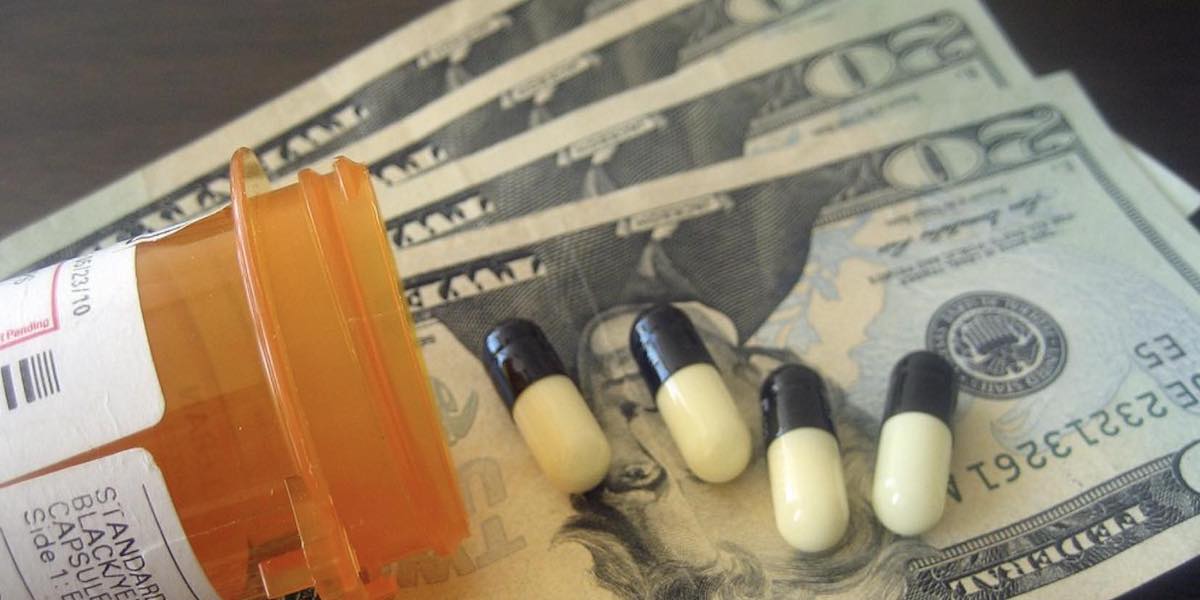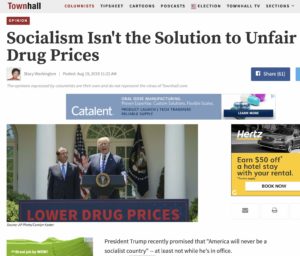
30 Aug 2019 Price Controls a Poor Prescription for America’s Ills

In a new Townhall commentary, Project 21 Co-Chairman Stacy Washington explains how a Trump Administration proposal she suggests would impose “European-style price controls” on prescription drugs will force the President to retreat on his promise that “America will never be a socialist country.”
“Fighting socialism with socialism,” Stacy writes, “will only harm patients.”
At issue is a plan promoted by the U.S. Department of Health and Human Services (HHS) to set Medicare reimbursement rates – the price the government pays for prescription drugs under Medicare Part B – closer to what foreign governments are paying for the same drugs (“at most, 26 percent more than the average developed nation price”).
Stacy remarks:
Their plan, though well-intentioned, misses the mark. It rewards freeloaders rather than punishing them. And it would jeopardize Americans’ access to state-of-the-art drugs.
In the commentary, she explains the inherent risk with this idea:
Countries with socialized healthcare systems frequently impose price controls on innovative drugs. Governments flat-out refuse to cover medicines that cost more than an arbitrary limit. If manufacturers want to sell their drugs in those countries, they have to heavily discount them.
That forces drug companies to generate a disproportionate share of revenue from countries, like the United States, that have comparatively free markets in healthcare. America accounts for just 5 percent of the world’s population and a quarter of the global economy – but funds 44 percent of global pharmaceutical research and development.
It’s this reliance on others doing their part, she notes, that leads to a definite problem with the viability of such a plan:
The administration hopes this plan will force other countries to pull their weight. But in reality, those governments won’t budge. Copying those nations’ socialist tactics will only make it harder for Americans to access new therapies.
Already, many of the newest drugs aren’t available in developed countries that impose price controls. Only two-thirds of new drugs launched worldwide between 2011 and 2018 are available in the United Kingdom. Roughly half are available in France and Canada. By contrast, 88 percent of those new drugs are available in the United States – including nearly 95 percent of new cancer medicines.
Not only does this raise the probability that Americans will pay more for life-saving drugs, it also sets up a disincentive for innovative new treatments to be developed in the first place. Stacy explains:
Medical research is a risky business. It costs $2.6 billion, on average, to develop a single new drug. And close to 90 percent of experimental treatments fail to gain FDA approval. Only the potential of profit incentivizes investors to fund these long-shot projects.
Price controls make it difficult – if not impossible – for companies to recoup their upfront costs, let alone earn a profit. They thus kill the incentive to invest in cures. If HHS adopts these price caps, drug development will grind to a halt – and patients will suffer.
So how can the Trump Administration find a happy medium that protects consumers and lowers their costs? “Negotiating better trade deals,” Stacy suggests, “could stop foreign governments from effectively robbing American innovators.”
To read all of Stacy’s commentary – “Socialism Isn’t the Solution to Unfair Drug Prices” – at the Townhall website, click here.




